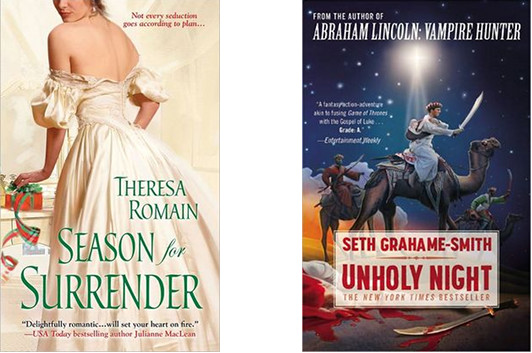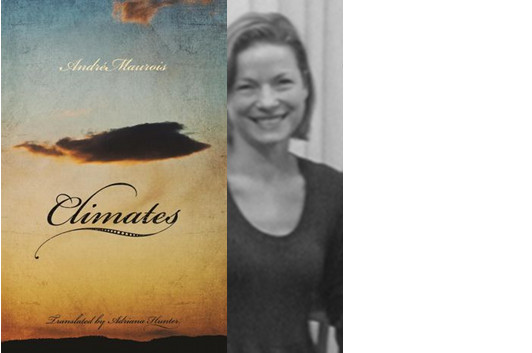Read This: Unholy Night & Season for Surrender

As some longtime Beatrice readers may recall, once Thanksgiving’s over, I like to read Christmas stories. This year, after a recommendation by my friend Sarah, I decided I wanted to check out Theresa Romain’s Season for Surrender. I actually started with Romain’s first novel, Season for Temptation, which was put forward as a holiday-themed story—with the tag line “Mistletoe can lead to more than kissing…”—but it turns out that the Christmas element only takes up a few chapters in a story that spans months. That story, about a young aristocrat who arranges an engagement to a suitable lady only to realize that he’s attracted to her younger sister (and she to him, although of course he doesn’t know that for a good long while), has a lot to recommend it, although it’s a bit rough around the edges in a debut novel-ish sort of way. The second time around, Romain seems to feel a bit more confident, and it makes for a much more sustained pleasure.
Season for Surrender picks up just about where its predecessor left off: Louisa, the unsuccessful fiancée of the first novel, is looking for some excitement in her life and accepts an invitation to a ten-day holiday party at the estate of Alexander, Lord Xavier. She accidentally overhears a conversation between Xavier and her cousin and learns that she’s the subject of a wager between the two of them as to whether she can last ten days in the company of such a notorious rake. So she decides to turn the tables on them… Meanwhile, Xavier, who was portrayed as a bit of a dick in the first novel, is now shown to be a sensitive fellow, ill at ease with the role he has come to play in society, but unsure of how to reinvent himself—or whether anyone would take him seriously if he did.
The slow burn of Louisa and Alex’s relationship is handled quite well, and the firm boundaries of the holiday period and the country estate also work in the story’s favor. I liked that Romain didn’t lean as heavily on the “unconventional aunt” character as she did in Temptation; Lady Irving is a fun character, but a little of her can go a long way—and with two leads this strong, the supporting cast can be used less to supply “color” and more as interesting personalities in their own right (some, admittedly, more interesting than others). I would actually recommend starting with this novel, then circling back to its predecessor if you want to spend some more time in Romain’s world.
13 December 2012 | read this |
Adriana Hunter: Discovering Fresh Climates

photo: Peirene Press
Over the last decade or so, Adriana Hunter has become one of the leading English-language translators of contemporary French literature, but with Climates, she’s taken on something new, or rather something not so new—André Maurois wrote Climats in the late 1920s, and it was a bestselling sensation not just in France but throughout Europe when it was first published. (At the time, it was brought to the United States as Atmosphere of Love; in the 1980s, a new translation appeared under the title The Climates of Love.) In this guest essay, Hunter talks about the challenges she faced in making a novel that’s nearly 85 years old “fresher” while staying true to the language conventions of the era.
My “way in†to translating any book is its narrative voice. I hear a voice and get a feel for its tone, rhythms and word patterns. André Maurois’s Climates of Love was a little more complicated because there are two narrators, Philippe and Isabelle, as well as less formal extracts from Philippe’s private notebooks and from letters. On top of this, there is the question of period: Climates was written in the 1920s, and my publisher had asked me to update the prose, making it feel fresher but without anachronisms (infatuation and jealousy probably feel the same now as they did a century ago, but other sensibilities and constraints in the book are very specific to the characters’ era, and I was keen to respect these).
Having previously translated only contemporary writers, I found the question of period and anachronism an enjoyable new challenge. In Maurois’s original, even the dialogue can sound like writerly prose whereas in a lot of contemporary fiction even the prose sounds like colloquial dialogue. I wanted to strike a balance, making the prose accessible but still with the poise and restraint of another era. I hope this sentence from the first page illustrates this:
“That is the charm of new acquaintances: the hope that, in their eyes and by denying the truth, we can transform a past that we wish had been happier.â€
Which might have sounded more natural as:
“That’s what’s nice about meeting new people, you can always hope that—if you deny the truth yourself—you can make them believe your past was happier than it was.â€
This is a perfectly valid translation, but look at those modern contractions (that’s what’s), those muscular dashes around a clause and that gangling repetition of “wasâ€. It just doesn’t sound like someone from Philippe’s background in the 1920s.
10 December 2012 | in translation |

 Our Endless and Proper Work is my new book with Belt Publishing about starting (and sticking to) a productive writing practice.
Our Endless and Proper Work is my new book with Belt Publishing about starting (and sticking to) a productive writing practice. 
